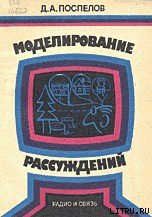Психология оценки и принятия решений - Плаус Скотт (читать книги онлайн бесплатно полностью без .txt) 📗
Hawkins, S. A., Hastie, R. (1990). Hindsight: Biased judgments of past events after the outcomes are known. Psychological Bulletin, 107,311—327.
Heider, F. (1958). The psychology of interpersonal relations.New York: Wiley.
Henchy, Т., Glass, D. C. (1968). Evaluation apprehension and the social facilitation of dominant and subordinate responses. Journal of Personality and Social Psychology, 10,446—454.
Henslin, J. M. (1967). Graps and magic. American Journal of Sociology, 73,316-330.
Hershey, J. C, Schoemaker, P. J. H. (1980). Risk taking and problem context in the domain of losses: An expected utility analysis. Journal of Risk and Insurance, 47,111—132.
Hewstone, M. R. C, Jaspars, J. M. F. (1987). Covariation and causal attribution: A logical model for the intuitive analysis of variance. Journal of Personality and Social Psychology, 53,663—672.
Hill, G. W. (1982). Group versus individual performance: Are N + Iheads better than one? Psychological Bulletin, 91,517—539.
Hilton, D. J., Slugoski, B. R. (1986). Knowledge-based causal attribution: The abnormal conditions focus model. Psychological Review, 93,75—88.
Hilts, P. J. (1990, September 26). Major gains are cited for smokers who quit. New York Times,p. B4.
333
Hintzman, D. L. (1969). Apparent frequency as a function of frequency and the sparing of repetitions. Journal of Experimental Psychology, 80,139—145.
Hippler, H., Schwarz, N. (1986). Not forbidding isn't allowing: The cognitive basis of the forbid-allow asymmetry. Public Opinion Quarterly, 50,87-96.
Hoch, S. J. (1984). Availability and interference in predictive judgment. Journal of Experimental Psychology: Learning, Memory, and Cognition, 10,
649-662. Hoch, S. J. (1985). Counterfactual reasoning and accuracy in predicting
personal events. Journal of Experimental Psychology: Learning, Memory,
and Cognition, 11,719-731. Hofstadter, D. R. (1985). Metamagical themas: Questing for the essence of
mind and pattern.New York: Basic Books. Hogarth, R. M. (1975). Cognitive processes and the assessment of subjective
probability distributions. Journal of American Statistical Association, 70,
Hogarth, R. (1987). Judgment and choice (2nd ed.).New York: John Wiley and Sons.
Hooke, R. (1983). How to tell the liars from the statisticians.New York: Marcel Dekker.
Hornstein, H. A., Fisch, E., Holmes, M. (1968). Influence of a model's feeling about his behavior and his relevance as a comparison other on observers' helping behavior. Journal of Personality and Social Psychology, 10,222-226.
Hunter I M. L., (1964). Memory.Middlesex, England: Penguin Books.
Ingham, A. G., Levinger, G., Graves, J., Peckham, V. (1974). The Ringel-mann effect: Studies of group size and group performance. Journal of Experimental Social Psychology, 10,371—384.
Irwin, F. W. (1953). Stated expectations as functions of probability and desirability of outcomes. Journal of Personality, 21,329—335.
Irwin, F. W., Metzger, J. (1966). Effects of probabilistic independent outcomes upon predictions. Psychonomic Science, 5,79—80.
Irwin, F. W., Snodgrass, J. G. (1966). Effects of independent and dependent outcome values upon bets. Journal of Experimental Psychology, 71,282-285.
Isen, A. M., Daubman, K. A., Nowicki, G. P. (1987). Positive affect facilitates creative problem solving. Journal of Personality and Social Psychology, 52,1122-1131.
Isen, A. M., Geva, N (1987). The influence of positive affect on acceptable level of risk: The person with a large canoe has a large worry. Organizational Behavior and Human Decision Processes, 39,145—154.
Isen, A. M., Patrick, R. (1983). The effect of positive feelings on risk taking: When the chips are down. Organizational Behavior and Human Performance, 31,194-202.
334
Ives, G. (1970). A history of penal methods: Criminals, witches, lunatics.
Montclair, NJ: Patterson Smith. Janis, I. L. (1982). Groupthink: Psychological studies of policy decisions and
fiascoes(2nd ed.). Boston: Houghton Mifflin.
Jenkins, H. M., Ward, W. C. (1965). The judgment of contingency between responses and outcomes. Psychological Monographs, 79,(Whole No. 594). Jenkins, J. J.(1981). Can we have a fruitful cogninive psychology? In J. H. Flowers (Ed.). Nebraska symposium on motivation, 1980.Lincoln: University of Nebraska Press.
Jennings, D. L., Amabile, T. V., Ross, L. (1982). Informal covariation assessment: Data-based versus theory based judgments. In D. Kahneman, P. Slovic, A. Tversky (Eds.), Judgment under uncertainty: Heuristics and biases.Cambridge, England: Cambridge University Press.
Johnson, E. J., Tversky, A. (1983). Affect, generalization, and the perception of risk. Journal of Personality and Social Psychology, 45,20—31.
Jones, E. E. (1979). The rocky road from acts to dispositions. American Psychologist, 34,107—117.
Jones, E. E., Davis, К. Е. (1965). From acts to dispositions: The attribution process in person perception. In L. Berkowitz (Ed.), Advances in experimental social psychology(Vol. 2, pp. 219—266). New York: Academic Press.
Jones, E. E., Harris, V. A. (1967). The attribution of attitudes. Journal of Experimental Social Psychology, 3,1—24.
Jones, E. E., Nisbett, R. E. (1971). The actor and the observer: Divergent perceptions of the causes of behavior. In E. E. Jones et al. (Eds.), Attribution: Perceiving the causes of behavior.Morristown, NJ: General Learning Press.
Jones, E. E., Wood, G. C, Quattrone, G. A. (1981). Perceived variability of personal characteristics in in-groups and out-groubs: The role of knowledge and evaluation. Personality and Social Psychology Bulletin, 7,523—528.
Jones, R. T. (1971). Tetrahydrocannabinol and the marijuana-induced social "high", or the effects of the mind on marijuana. Annals of the New York Academy of Sciences, 191,155—165.
Jussim, L. (1986). Self-fulfilling prophecies: A theoretical and integrative review. Psychological Review, 93,429—445.
Kahneman, D. (1991). Judgment and decision making: A personal view. Psychological Science, 2,142—145.
Kahneman, D., Knetsch, J, L., Thaler, R. H. (1990). Experimental tests of the endowment effect and the Coase theorem. Journal of Political Economy, 98,1325-1348.
Kahneman, D., Tversky, A. (1972). Subjective probability: A judgment of representativeness. Cognitive Psychology, 3,430—454.
Kahneman, D., Tversky, A. (1973). On the psychology of prediction. Psychological Review, 80,237—251.
335
Kahneman, D., Tversky, A. (1979). Prospect theory: An analysis of decision under risk. Econometrica, 47,263—291.
Kammer, D. (1982). Differences in trait ascriptions to self and friend: Un-confounding intensity from variability. Psychological Reports, 51,99—102.
Kantola, S. J., Syme, G. J., Campbell, N. A. (1984). Cognitive dissonance and energy conservation. Journal of Applied Psychology, 69,416—421.
Karmarkar, U. (1978). Subjectively weighted utility: A descriptive extension of the expected utility model. Organizational Behavior and Human Performance, 21,61—72.
Kassin, S. M. (1979). Consensus information, prediction, and causal attribution: A review of the literature and issues. Journal of Personality and Social Psychology, 37,1966-1981.
Kelley, H. H. (1950). The warm-cold variable in first impressions of persons. Journal of Personality, 18,431—439.
Kelley, H. H. (1967). Attribution theory in social psychology. In D. Levine (Ed.), Nebraska symposium on motivation, 1967.Lincoln: University of Nebraska Press.

![Озарение [Версия без таблиц] - Логвинов В. Н. (книги онлайн TXT) 📗](/uploads/posts/books/63698/63698.jpg)
![Озарение [Версия с таблицами] - Логвинов В. Н. (смотреть онлайн бесплатно книга TXT) 📗](/uploads/posts/books/63699/63699.jpg)

